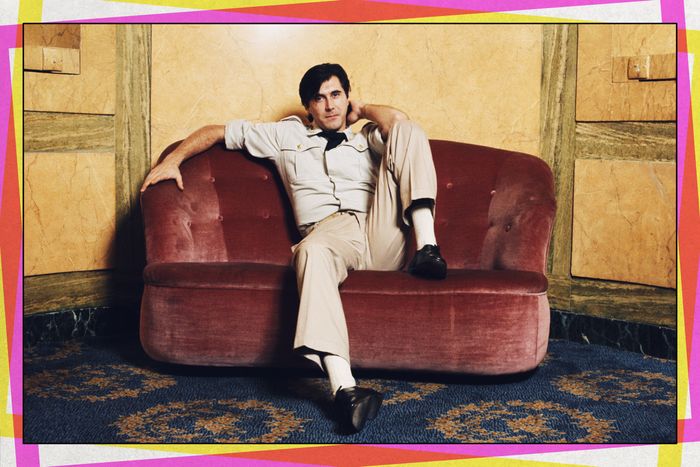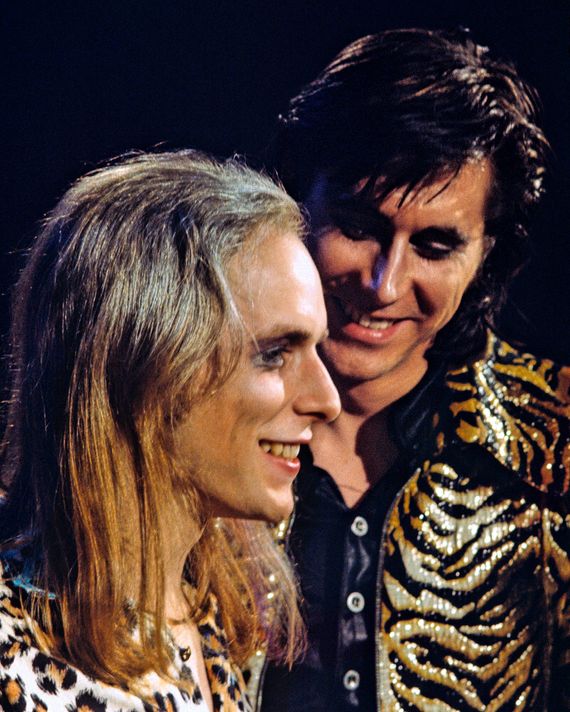
The opening line of Roxy Music’s “Do the Strand” — saxophone blasting, synthesizer twisting — flies off the hinges with:
“There’s a new sensation, a fabulous creation.”
Yes, the lyrics insist that it’s a danceable solution to teenage revolution. But I also happen to think it’s a perfect description of Bryan Ferry himself, the wildly debonair bard who served as the band’s front man and chief songwriter throughout their five decades together. Starting with their 1972 eponymous debut, Roxy’s whole ethos, held over from their art-school rearing, was that there weren’t any limitations to what was coming out of the studio — the complex arrangements, the absorbent influences. Sure, compose an ode to an inflatable doll. Why not throw in that oboe solo? More of this melancholic outro, please. Ferry’s evolution with Roxy’s discography almost doubles as that of a painter, uninhibited by his canvas, working his way through as many movements as he fancied. A quick game of album roulette will reveal the Pop-art triumph of For Your Pleasure, the lushly baroque sounds of Siren, the weary romanticism of Avalon.
Maybe this is a roundabout way of saying that Roxy Music was redecorating hotel rooms while their contemporaries were trashing them.
Roxy fans across the western hemisphere will be partying like the cover of Manifesto this autumn, as Ferry, saxophonist Andy Mackay, guitarist Phil Manzanera, and drummer Paul Thompson are set to reunite for an arena tour in celebration of their 50th anniversary. Ferry is a hard guy to pin down — he doesn’t do interviews a lot (not that he has to) and is surprisingly modest for being the patron saint of lounge lizards. But this is an historic moment for the band, and so the perfect time to reminisce. I’ve never been quite as excited to say: Ferry is our newest Superlatives subject.
Best song
“Mother of Pearl” always comes up as a favorite for me, because it’s very wordy and I feel that it has very interesting lyrics. It’s emotional, and yet it jumps around from one structure to another, which I like. It was on the third album, Stranded, and I felt I was on a bit of a roll with my writing at that point. Yeah, it’s the only song I didn’t write on the keyboard. I took a bass guitar away with me for a couple of weeks to do some writing. I had a small keyboard and a cassette, and I recorded it. I wrote the song out in Greece, and my friend Simon Puxley was with me, who was Roxy’s press agent in the early days. He wrote the sleeve notes on the first Roxy album. “Mother of Pearl” is a song I very rarely play live because it’s such a long song. It’s one of those songs where I felt I got it right for myself.
It took some great playing on the actual record as well. Great drumming from Paul Thompson. John Gustafson, the bass player, was outstanding. Yeah, I think it worked very well. It’s one of the highlights of Roxy. The album before it was For Your Pleasure; that’s probably my favorite album, overall. But after For Your Pleasure, I did my first solo album, which was full of covers. It was like being on holiday away from my own writing. When I came back to writing a few weeks later with “Mother of Pearl,” it was nice to write something new again. It worked.
Most seductive song
I suppose “Avalon” has a seductive mood that people like. It’s one of our slow and atmospheric songs. It was beautifully mixed by Bob Clearmountain. We did that at the Power Station Studio in New York. Yeah, it captured a mood; captured a moment. I started writing the song when I was in Ireland. Then we did some work on it in Nassau at Compass Point Studios, I remember. So it has a kind of island mood about it. But there’s a sophistication to it, which, being in New York, must have played some part.
Most poetic song
“More Than This.” It uses very few words, but it seems to get them in the right order. It’s introspective. It’s great when that type of emotion strikes a chord with people. Some of the other songs that I’ve done with the band and on my solo records have been a bit more obscure, but “More Than This” really appealed to people. The combination of when you get the tune and the lyrics that work together, it’s a great thing. It touches people. That’s what you want to do with music — to make contact and to get an emotional response. We made a music video for “More Than This.” That was never my favorite thing, making videos. Being in the studio and making records was exciting for me and still is.
Quickest song you wrote
It would be “Virginia Plain.” I had a rough sketch for it when we did the first Roxy album, and when we finished it, we were really surprised at how successful the album was in the U.K. and in Europe as a whole. But the record company came to us and said, “There isn’t really a single on the album. The album’s doing great, but can you quickly give us a single?” So I wrote up this song, this sketch of a song, and turned it into the finished “Virginia Plain” really quickly. There was a lot of pressure to do that. When the American edition of the album came out a short while later, “Virginia Plain” was added to it. So it was done quickly, but it was done with a lot of energy and a lot of fire, if you like. It ended up becoming quite popular over here.
Song you covered that may sound better than the original
I can’t be precious enough to say that any of my covers is “better” in that sense, but the one I’m most proud of is “A Hard Rain’s A-Gonna Fall.” It was my first cover. The first single from my first album, These Foolish Things. I remember it was a very spontaneous way it was made. The whole album was made really quickly. I just felt like doing an album of other people’s songs for a change! I thought, I must choose a Bob Dylan song. Because he writes such great lyrics and really strong songs. I chose that one, and I worked it out on the piano — just pounding those keys. It was very different from his version. You don’t try to beat what the original version is. You just try to do something a bit different and take the song into a slightly different place. These Foolish Things had some people from Roxy in it. Paul Thompson played drums on the record. A friend of mine, John Porter, played on Roxy’s second album. He helped me produce the record and played bass and guitar. Oh, Eddie Jobson did a great string arrangement. I remember I had really good background vocalists who worked with Dr. John. Yeah, the whole record was done with such good energy. So that’s memorable for me.
I’ve never heard back from Bob Dylan. I don’t know how he feels about the covers. He might like some of them, I don’t know. They’re all such great songs and such great lyrics. As a singer, you always want to sing great words. Such beautiful imagery and so on. Essentially, I’ve enjoyed doing covers of other people’s stuff over the years as a way of getting away from my own writing — extending the repertoire in different ways. I’ve found it quite interesting for me to do that.
How you define Roxy Music’s manifesto
It’s trying out different things — experimenting and exploring sounds and textures. Trying out combinations of instruments and so on. With writing in particular, trying to go to different places and creating a body of work that’s interesting to perform. So when we do the anniversary tour, we will hopefully be representing different aspects of the band and periods from all the albums. But at its core, it’s experimenting with musical styles. We didn’t want to be a one-trick pony.
Album that was most collagelike to create
Definitely the first album, Roxy Music, which juxtaposes so many ideas and styles. That made the record interesting. It was the first record any of us had made in the band. We were so excited just to do it! Putting those songs together, it was a joy for us. I think those songs on the album point in different directions that Roxy could have gone. We followed some of those paths on subsequent records. There are a lot of American influences. “Re-Make/Re-Model” is very hard-driving and was influenced by the Velvet Underground, one of my favorite bands. Whereas something like “Ladytron,” it starts off with this almost country-rock sound. It was kind of an atmospheric, lunar-landscape soundtrack. Then it goes to a wild guitar solo at the end. It seems to jump from one thing to another. Very strange sounds. [Laughs.] So out of that comes a country-rock section of the record. Same with “If There Is Something.” Each part of that song seems to go in a different direction, but it all makes sense when we finally put it all together. “2HB” is a song that was inspired by Casablanca with Humphrey Bogart. It’s a great movie, and it was my tribute to Hollywood.
Most atmospheric album
Avalon. That whole record had a very nice mood to it. It has a very complete mood that people seem to like.
Album that exudes the most glamour
The most glamorous album is probably — and I don’t know why I say this, but — For Your Pleasure. It’s a dark, focused, and steady record. It has something about it that says glamour to me, but it’s very hard to say what appeals to me. Visually, glamour is so many things. I went to art school when I was a teenager. It’s strange how you develop an aesthetic that you like. It’s trial and error of finding things that you find appealing. I like a lot of old Hollywood movies, film noir in particular. I like movies that are in black-and-white. I find them very glamorous, all of the great musicals, films with Cary Grant or Humphrey Bogart. People in suits — that’s a look that works for me. I guess it was because I’d seen all these great movies growing up. Those were all in my mind while making For Your Pleasure.
Most endearing Brian Eno memory
It’s the first time I met him, really. He came to the place we were rehearsing and working, when I was putting together the band. He came along to record what we were doing there. There were only three of us in Roxy at that point. We didn’t have a tape recorder, so Andy Mackay said, “I know this guy, Brian Eno, who’s got a tape recorder.” So he came to my place where we were rehearsing. He brought this huge tape recorder called a Ferrograph. It was a reel-to-reel thing. We got on immediately. Just the sight of him. I still remember him coming through the door, carrying this huge recorder. He recorded us and then officially joined the band that night.
More From The Superlative Series
- Hans Zimmer on His Most Unusual and Underrated Scores
- The Coolest and Craziest of TLC, According to Chilli
- Kim Deal on Her Coolest and Most Vulnerable Music



